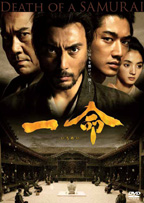

Ichimei
Japan 2011
Genre:
Drama
Director:
Takashi Miike
Cast:
Ebiz˘ Ichikawa
Eita
K˘ji Yakusho
Hikari Mitsushima
Naoto Takenaka
Hirofumi Arai
Kazuki Namioka
Munetaka Aoki

Hara-Kiri: Death of a Samurai
Story: In the year 1630 a time of peace begins in Japan. To the regret of the samurai as they don't have much left to do anymore.
The ones who are especially unfortunate don't have a lord they are serving and now have to somehow make ends meet with their lost honor
carrying along with them. Hence, it often happens that ronin, masterless samurai, appear before a wealthy lord and ask for permission to commit seppuku, a
ritual suicide, at his place. In many cases the lords don't want to deal with something like that, yet they also can't just ignore the plea since they
would lose face in this case. Therefore, the ronin are convinced to rethink their decision by offering them a position at the lord's place or giving them
a few coins. However, this leads to more and more ronin turning up who are trying to beg for money this way. The young samurai Motome (Eita) is one of them,
but the representative of the lord (K˘ji Yakusho) he introduces himself to wants to put paid to this form of begging and make an example of the samurai.
He grants Motome his wish. Shortly thereafter the samurai Hanshiro (Ebiz˘ Ichikawa) appears before the representative with the same plea. But it turns out
that Hanshiro and Motome share the same past.
Review: For some reason director Takashi Miike made it his business the last few years to shoot more commercial movies or at least not
that radical movies like "Ichi - The Killer" or "Visitor Q" anymore. His last film "13 Assassins" already centered around samurais, but this time the
exceptional director approaches his subject in a lot more quiet and subtle fashion. He presents a remake of the drama "Harakiri" from the year 1962 that
deals with the hypocrisy of the samurais' code of honor. The tragic story in the movie is told through serene pictures and is free of any controversial ideas
Miike normally implements into his movies. This also makes the drama quite ambitious and it is shot with enough technical finesse to win over a wide audience
as well.
The story is based on a novel by Yasuhiko Takiguchi and thus it is also composed pretty smartly. The story is mainly told in flashbacks in which the whole
scale of tragedy concerning Motome's suicide becomes apparent through quiet pictures. While the samurai may just be a beggar to us at first who happens
to miscalculate in regard to his ruse we learn the reasons that made him go to such desperate lengths. Without wanting to give away too much, it
is obvious that for Motome everything goes wrong that could go wrong. He is a man, who lives in bitter poverty even though he is educated and teaches little
children reading and writing. He can't properly feed his wife and child and when they become ill the unfortunate chain of events is set into
motion.
The original title of the movie is actually translated as "A Life" and that's also name of the game. Motome's life gets destroyed by the samurai's
code of honor and despite the scenes during the middle of the movie being even a bit too sentimental at times the fate awaiting Motome's family is very
emotionally captivating. Also playing a part in that are the good actors like Eita ("Memories of Matsuko", "Nodame Cantabile") or the former Kabuki-actor
Ebiz˘ Ichikawa who has a very strong screen presence. The drama is also accompanied in the right places by a fitting soundtrack from the pen of Ryűichi
Sakamoto ("Appleseed"), yet you can't deny that "Hara-Kiri" also drops in pacing occasionally and is treading water. It is absolutely apparent from the
beginning that this isn't an action movie but the running time of 126 minutes still is a bit too much in the end.
There aren't any violent scenes characteristic of Miike to be seen, with one exception. When Motome is supposed to commit seppuku he has to do it with his
own wakizashi. But Motome had to sell his swords in order to get some money and so he only owns some wooden swords. Still, it is demanded that Motome uses
his own "blade" to commit seppuku. Even though we actually might not see much it is more than anything else the imagination and the good sound effects that
manage to stretch this scene out until it becomes unbearable. At the end there is in fact a sword fight finding its way into the movie, too, but it is rather
unspectacular. Director Miike isn't interested in cheap showmanship but instead really puts together an honest and well done drama.
What's especially well achieved are the pictures. Cinematographer Nobuyasu Kita ("Shinjuku Incident", "13 Assassins") delivers good work and makes the
pictures gain some weight. Still, why the movie has been shot in 3-D eludes my understanding. Nonetheless, "Hara-Kiri" remains a visually wonderful drama,
that gains depth as it progresses and can move you with its tragical story revolving around honor, revenge and a dusty code of ethics. Takashi Miike
always tried his hand on different genres, but "Hara-Kiri" is maybe his most conventional and quiet film to date. It doesn't fit him bad in fact and
makes us hope to see future films like this from him.

Disclaimer





















